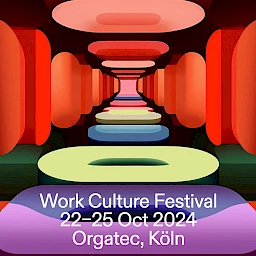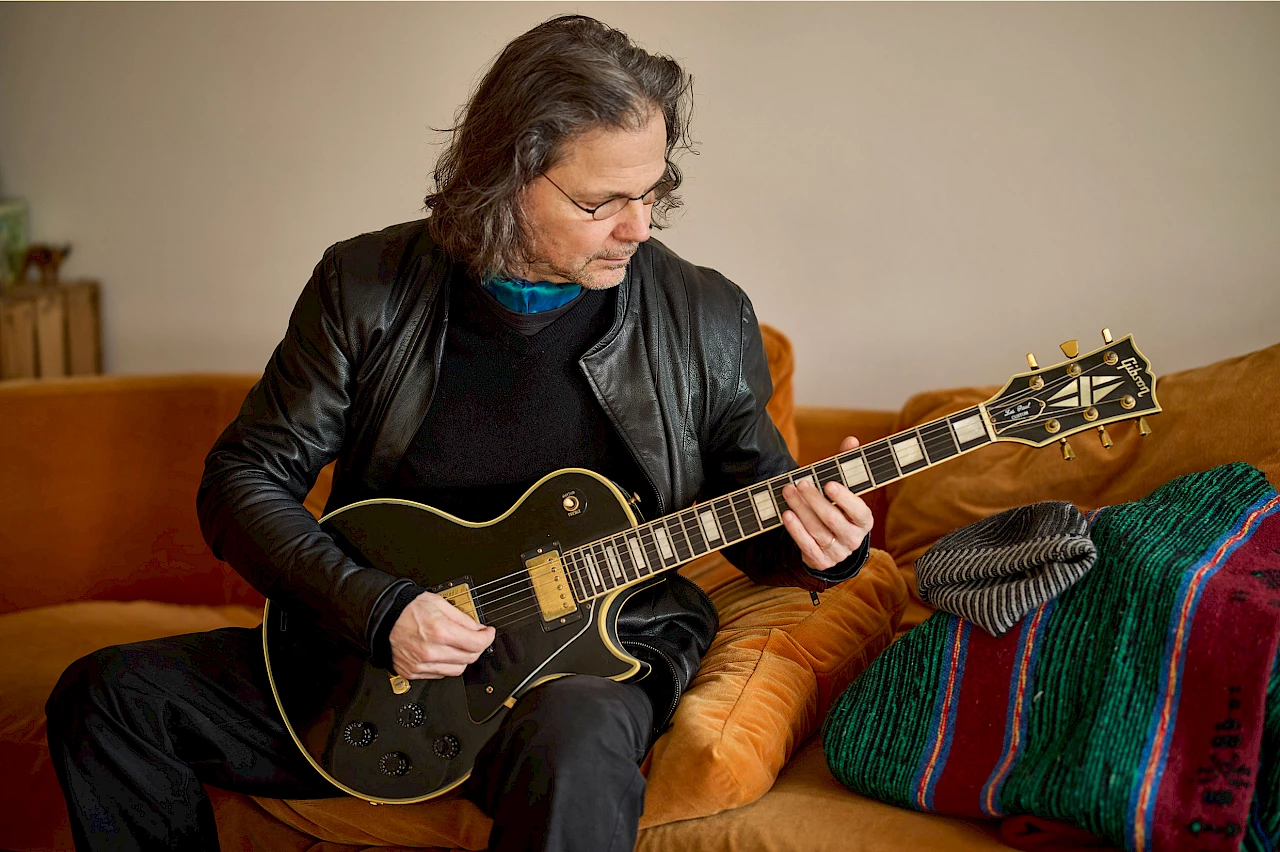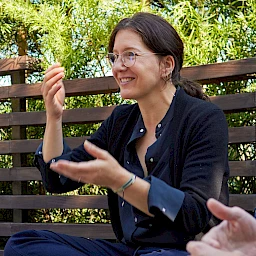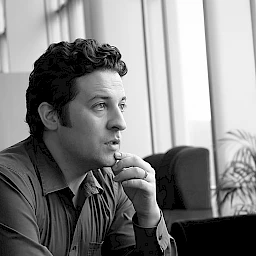Walter Werzowa, a music producer and the founder of the music therapy start-up HealthTunes, will give a lecture at the Work Culture Festival on 23 October 2024 on the topic “Supported by Sound, or Why Music Can Inspire Work”. The IBA Forum editorial team spoke with him about the complex role of soundscapes in the workplace, the question of whether absolute silence is indeed a key to productivity, and how thoughtfully selected sounds and melodies can foster enhanced focus and creativity.
What inspired you to research the healing effects of music and to focus on this topic?
When my youngest son was five years old, he was diagnosed with Legg-Calvé-Perthes disease (LCPD). It’s painful and quite a long process. We decided against surgery and instead focussed on alternative healing methods such as osteopathy, acupuncture and cell healing. Fortunately, he recovered quite quickly, which also mesmerized the doctors treating him. I realised that sound and music had played a big part in his recovery. And as a thank you – I became very successful in my life – I decided to give something back to parents and patients with the same fate by starting to develop HealthTunes, a streaming platform that makes evidence-based music therapy usable for various medical applications such as anxiety as well as burnout and Alzheimer’s.
Can you explain to our audience how music can specifically help to reduce stress and increase well-being at the workplace or in offices?
Music reduces stress in many ways and increases well-being in the workplace. Sound, melody and rhythm synchronise brain waves, heart rate and breathing, leading to relaxation and improved concentration. HealthTunes integrates binaural frequencies that promote specific brain wave patterns and thus reduce stress. Music also positively influences emotions, lifts one’s mood and supports productivity. These combined effects create a harmonious and pleasant working environment. One example of the powerful effect of music is the Mozart Sonata in D major, K 448, which has been shown in clinical studies to reduce epileptic seizures by up to 70%. This sonata is currently being researched to find out why it has such a powerful effect on epilepsy patients, especially those who are drug-resistant.
Visit the Work Culture Festival from 22 to 25 October at ORGATEC in Cologne

You told me before that you want your work to be evidence-based. Is the study you talked about an example of scientific proof for the healing effects of music?
Yes. And we all know that we use music for workouts in order to get pumped up and energized, and we use it in sports to help us swim with muscle memory. It’s so much easier to memorize timings and procedures with music. Kids won’t learn the alphabet by just learning A, B, C, D, E, F, G, but if they learn that alphabet song, they have it in a minute, and they sing it. And by singing it, they remember the words. It’s just so much easier with music. I’m a trained musician, and I really love music. And I think more and more that the first role of music is to promote our health. And maybe the second is entertainment.
Let’s come back to office workplaces. How can music be used to boost employee productivity and creativity or even promote more concentration?
Music can be used in offices to increase productivity and creativity by connecting teams and promoting concentration. It helps to reduce aggression and creates a positive atmosphere. Even short musical interactions, such as tapping together in the morning or listening to HealthTunes playlists, can prevent burnout and make the working day more enjoyable. Such programmes not only improve the well-being of employees but also increase efficiency and team dynamics. Starting the day with music means it’s more fun to go to work, and for the companies that will mean higher productivity and joy, so it’s a win-win-win.
So it’s not only doing music together, tapping together, but also starting with specific HealthTunes music in the offices. Can you give us one or two more practical examples so that we can imagine how it works in real life?
The most important thing is your music preference, meaning that you need to listen to the music you like. There is just one exception, of course, and it’s that Mozart piece regarding epilepsy. We tested and found out that it does not matter if you love or hate Mozart’s music, it works. But if you love jazz music and I would give you hard rock, it would not work, and vice versa. But any music can be powerful. We sometimes think that if it’s loud or aggressive, it wouldn’t work. And for that I have this beautiful anecdote from a hospital here, where an older man was dying of cancer and it was clear to him and the doctors that he would leave this planet that night or maybe the next day. The doctor believed in music and the power of music and asked, would you like to listen to some music now? And the guy nodded and said, yes. And the doctor said, what would you like to listen to? He said, AC/DC. Probably anybody who hears the story would think, oh my God, you’re dying and you want to listen to AC/DC? And so the doctor said, of course, we’ll bring it to you, but may I ask you why? And he said, I was married for 50 years. My wife hates AC/DC. I always loved AC/DC. And a couple of hours later, he passed away in a pretty relieved, non-anxiety ridden state of mind.
What feedback have you received from companies and the employees who use HealthTunes?
One of the strongest feedbacks is that the whole team aspect is increasing, even if you don’t tap together but if you start your day by coming in and enjoying. The point really is to enjoy that five to ten minutes of creative music. And you get a little note at the end to review the experience and to say, I feel better, worse, or the same. So you really check into yourself: How are you today? Music is a powerful ritual and connector that is helping companies to bring in a little bit of positiveness into the lives of the employees.
Do you think there are differences in the impact of music in the workplace, depending on the industry or the type of work involved?
Yes, and it’s more genre-specific. One of the findings that gave me a chuckle and put a smile on my face was that lawyers in the States love 80s rock music, which is just funny. Doctors also tend to listen to that kind of music. Workforces have specific music preferences, of course, and there are outliers. And I learned from Apple Music, Apple Classic, that we don’t have that specific listener any more. There’s not that person that only listens to Beethoven and Mozart or only Nine Inch Nails. It seems the majority of listeners and subscribers listen all through the genres, depending on how they feel and what they want to feel. We do have a huge amount of different genres ranging from ambient and techno to EDM and jazz and classic and different classical styles, so that you can find out what your preference is and get into the journey of your individual health music.
You said there are different genres and there are also different personalities. How do you explain the effect that some people can work more effectively with music while others prefer absolute silence?
There could be many factors. We humans are driven by habituation and I know that myself. I grew up in Vienna. My father’s medical practice was also our home apartment. Those were the days when we had to be very quiet and soft-spoken. Even after living for 30 years in the States, where it’s really loud, I’m not capable of changing that behaviour. And so because we grew up in that quietness, I think we do prefer that, but if you were born into an Italian family with five brothers and sisters, you probably like a different kind of commotion and energy level. So yes, we’re all different.
Let’s talk a bit about technology. How does technology play a role in integrating music into workplaces, for example, particularly now in relation to your work with healthcare students?
Technology is essential for integrating music into the workplace by making music accessible and personalizable. Streaming services are an easy way to play music, while biosensors provide personalised feedback to tailor music to the needs of employees. My work with healthcare students in particular shows how AI can take over routine tasks, for example in medical diagnosis, giving doctors more time to focus on their patients and take time for them, allowing them to respond to them more empathetically. In this way, technology improves not only efficiency but also human interaction in the work environment.
I have two last questions. How is the interplay between AI and human creativity changing the way music is composed and experienced?
AI is definitely shifting music composition, but not as radically as earlier developments such as Werckmeister’s well-tempered piano or Bach’s sonatas did. I see AI as a tool that supports the creative process but doesn’t replace it. The creative act itself remains crucial and valuable. Unfortunately, many people lose their capacity for creative expression in the course of their lives. AI could help to revitalise lost creativity by encouraging people to be creative again without fear of judgement or criticism.
What hacks would you give to companies that want to use more music as an integral part of their work culture?
Call me.
Walter, thank you for the interview.






